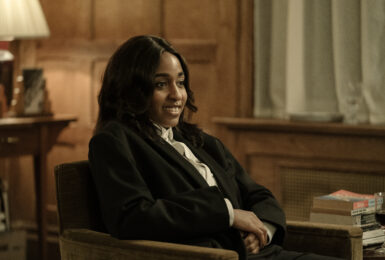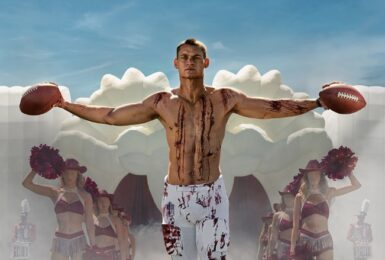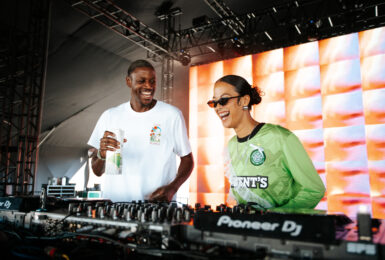Art
interview: trans actress indya moore on representation: putting a trans face on an anti-trans institution is not enough
As a model, New York City-based Indya Moore has been sought out by clients as varied as Gucci, GQ Magazine, New York Fashion Week, Christian Dior, OAK, Ab[screenwear], Marquise Foster and Blackmamba. But the Afro-Latina transgender artist and social activist says her work in film, television and video is where she’s most excited to keep making waves.
When NPR’s First Watch debuted Indya’s leading role in J. Views’ music video “Don’t Pull Away (Ft. Milosh and Gotye),” its haunting narrative of unrequited love and bold challenge to the gender binary quickly chalked up over 6 million streams, the rising star’s beauty and chemistry with androgynous model Elliot Sailors resonating with viewers.
Most recently, Indya took on the role of Dijon in the feature film Saturday Church, directed by Damon Cardasis. Saturday Church was selected for competition in the upcoming Tribeca Film Festival where it premiered April 23. I had the opportunity to chat with the quick-witted game-changer about her career, identity and the limits and power of representation.
Tell me a little more about your background. You have had immense success as a model, before a more recent turn to acting. What was that journey like for you?
Growing up, people would tell me, “Oh you should be a model.” It wasn’t career option in my own head, but I was kind of pushed in that direction. I learned that, for most people, modeling isn’t a field that you choose to go into. I honestly didn’t think that it would be possible for me as a trans woman of color.
I was never the girl who wanted to be in the magazine and I’ve always felt that it was weird to crave that kind of recognition. It feels wrong to crave that kind of recognition, because I think it feeds a narcissistic state to want to want to be the center of attention just for the sake of attention. That isn’t a contribution to anyone. I feel like modeling engenders that kind of thinking.
Modeling photo session by Elvin Tavarez
That’s so fascinating to me. In my writing, I always critique the politics of representation for reasons I feel are related to what you’re saying. It seems that we as marginalized people are often encouraged to fight for more “representation” just for the sake of attention, without really doing anything to change the structure of the violence against us. And a lot of times we are called to do that by those structures. An anti-Black institution will be quick to slap a Black face over it, right?
Right. It’s like they’re pacifying people’s discomfort by putting a Black or trans person here or there. As an example, I felt very unhappy with how I was treated on the set of Gucci. They were casting trans people of color and not only did they not pay us for our work, but we barely got any camera time and the whole focus of this project was on this white couple. I’ve been paid a lot more and treated a lot better by independent brands as a person of color. Gucci didn’t even let us walk out with a garment.
I felt immensely disrespected that they were looking at it as if it was an opportunity for me, not for them. I was lucky to have the opportunity to be represented. This dynamic exists so much in society when it comes to trans women–even the men who date us think we are lucky to have them.
Christian Dior photo shoot by Tory Rust
So, representation can feel like a pacifier. They were using us just to say, “Look at what we’re doing, we’re progressive,” but still treating trans people like we’re stupid. It’s interesting how we become the reason they get money, but they still don’t respect us. I thought fashion was about creating clothing and putting it on folks who represent your clothes. But ultimately young Black sisters still aren’t seeing themselves respected and so even when Black women are on screen its not for them. They want us to try to fit a look that’s not for us rather than try to make clothes for us.
Fashion should be conforming to body types, not body types conforming to fashion. Clothes didn’t come first and then humans, humans came and said we need clothes to fit our bodies.
Right! We shouldn’t have to mold ourselves to fit into spaces that are violent against us.
And this is why you have these girls developing anorexia and other disorders. It’s very detrimental to women and women of color especially. And men–they feel they have to go to the gym everyday to adhere to these patriarchal concepts too.
As a very beautiful, thin person who is light-skinned, what position does this put you in, knowing how your image can be used in contrast to young Black girls who society doesn’t tell they are beautiful?
Modeling photo session by Steven Liang
I’m still taking this industry in. I’m learning it and I’m changing it. This is an industry that I go into like, “Okay, you want me to be a part of it? I’m going to change it.”
I also know that even when I’m called beautiful, I have a very fast metabolism and I’m very uncomfortable with my own body. The women in my family are very thick, and I wish I had their thickness, but it’s also like, “Why do I want that body type?” I shouldn’t want to have any body type that isn’t mine.
And the reason I want that body type is because the men in my community seem to be attracted to that, and so it’s like where do I fit? You have to walk this line. I don’t want to be another reason why women have issues with their body type. I’m tired of only seeing Black women with their hair short or a perm.
I really feel like Black women are intimidating to people in the industry and it’s a problem that we can’t be the people that we are if we want to navigate it. And as a trans woman of color, I have to worry about being ostrasized for speaking about it.
Modeling photo session by Steven Liang
Speaking of ostracization, the film you’re promoting now, Saturday Church, is described as a “musical coming of age story of Ulysses, a shy and effeminate teen whose identity and sexuality are slowly unfolding.” Can you tell us more?
Well, the film is about a 14-year-old boy who is navigating and conceptualizing the world around him. He wasn’t policed by his father, but has to live with his aunt and she was very aggressive and vigilant about his gender. She came from a very Christian background so she felt because he was perceived as a male he was supposed to behave in a certain way.
Ulysses eventually had a fall-out with the aunt because she was unhappy with the child exploring his mothers makeup so he left and went to the village and met some girls who walked up to him and saw that he was alone and they became very supportive figures in his life. I play one of them named Dijon.
Ulysses felt affirmed by these trans women and they looked out for him and became his friend because they had all gone through similar things and had each other. And this is The Village, where the pier and ballroom scene came to life for queer people of color.
Does this story reflect your own?
I feel like the main character reflects my life a lot. Not only does this story take place in my neighborhood, but this child not being accepted and navigating through a community with his background and trying to find that validation was something that really resonated.
Everyone wants their existence to be validated. Especially when they feel very different from everyone they’re growing up around. I found a community after I left my home. Even though my family loved me so much, they didn’t understand me. I can imagine them being alarmed and thinking that I needed help and it was all out of ignorance and that’s why this type of ignorance around gender is so detrimental.
I didn’t feel like I was different when I did something like try on my mother’s makeup or clothes, I felt different when I was treated like these things were an issue. I was treated as though I was malfunctioning when I felt like I was functioning just fine. I didn’t feel confused about myself until very natural behavior was policed. It’s always really damaging for a young person to feel like everything that they do naturally is an issue, so I related to Ulysses story completely.
Recently, there was much ado about the acclaimed writer Chimamanda Adichie’s comments about trans women. Her words seem to point to a critical juncture in the current feminist movement, raising the question of the place of trans rights:
“I think if you’ve lived in the world as a man with the privileges that the world accords to men and then sort of change gender, it’s difficult for me to accept that then we can equate your experience [as a trans woman] with the experience of a [cis] woman who has lived from the beginning as a woman and who has not been accorded those privileges that men are.”
What are your thoughts on the situation?
Not all trans women go through the world experiencing it as a man–even before presenting and identifying as a woman. she’s speaking from a place of ignorance, and, like I said, ignorance is extremely toxic. She doesn’t know that trans women before they identify as female will most likely be exhibiting behavior and features that are very feminine. This will immediately put a lot of pressure on them by society.
What I went through and my home is a small example of what people–trans women, feminine gay men and feminine men–go through. They do not benefit from male privilege because they don’t embrace masculinity enough. Even women who don’t identify as men but identify as AGs get so much respect from men because their embrace of masculinity. People who identify with masculinity get privilege. Trans women who experience life having to present as well as they can just to avoid violence and to be safe–Adichie is targeting them and saying that they experience this same privilege.
In fact, they’re constantly dehumanized for their feminine expression because people identify them as being gay or as having feminine tendencies. Women who are not female presenting go through just as much violence as women who are female presenting. And this is just a lesson for folks that if you want to learn about an experience go to the people who actually have that experience.
You occupy a unique space at the intersection of your trans and Afro-Latina identity. How does this inform your art and work?
One of the things I experience as an Afro-Latino is that once men find out that I’m Dominican they overstep their boundaries with their comments about Black people. I see this all the time people with people asking folks to change their African hair texture and everything. So I make a point to identify with my blackness and my transness and to be aware of my roots and be conscious of the everything trying to erase them or make me feel less than for them. This is my art. My art form is existing.
What’s next for you?
I created and am co-starring and co-wrting the upcoming web series, Mistranslated. It’s a collaboration with my writer partner Giselle Bleuz and director/cinematographer Danielle Lessovitz. (In another interview Indya describes the show as “Imagine a cool comedic yet dramatic mashup of Atlanta, Broad City and Awkward Black Girl…but deeper ’cause we’re dealing with the discounted experiences of women who are at the lower rung of the ladder, Black trans women.”) The series has 3 episodes completed and will be pitching at various international content markets for 2017.
“Mistranslated” still
I’m actually an aspiring biotech student, but I don’t really have the capacity to balance bills and school, considering the time I have to dedicate to acting and modeling. I dropped out in the 10th grade, got my GED, and went straight into working, so I’m looking to explore school again after I have my career stable.
I’ve always been interested in holistic medicine, but as a trans woman, I’m noticing an increasing need for new technologies. Someone I dated has a disease with his kidneys, and I’ve been coming into contact with people with autoimmune disorders that have challenged my idea that holistic medicine can cure anything.
There’s an actress–I can’t think of her name right now–who is also an annthropologist. My resources are very limited, but eventually I want to be a scientist as well as an actress when my resources aren’t limited.
(Other upcoming projects that showcase Indya Moore in leading roles are Spot the short film thriller directed by Jamie DiNicola and musical artist Boston Fielder’s upcoming noir short film/music video “If You Love Her,” produced by URB ALT Media.”)
*Hari Ziyad is a New York based storyteller and writer for AFROPUNK. They are also the editor-in-chief of RaceBaitR, deputy editor of Black Youth Project, and assistant editor of Vinyl Poetry & Prose. You can follow them on Twitter @hariziyad.
Follow Indya Moore: Facebook | Instagram | Website
Get The Latest
Signup for the AFROPUNK newsletter





